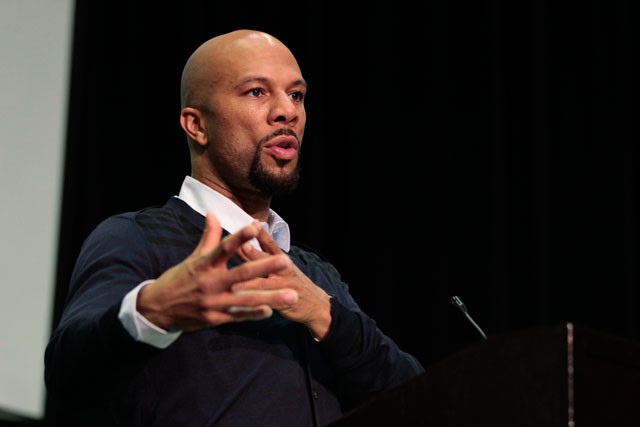Acclaimed hip-hop artist and actor Common came to Coffman Union on Friday, not to perform his unique brand of socially conscious hip-hop but to lecture to students and faculty on achieving oneâÄôs potential, his personal successes and failures and the role of hip-hop in the 21st century.
In his lecture, the 38-year-old Chicago emcee stressed the importance of finding oneâÄôs “greatness,” whether that be inside the classroom or out.
“You canâÄôt be afraid to wear your greatness,” he said at the lecture. “WhatâÄôs wrong with believing in yourself? You have a light inside of you, why would you dim that light?”
The event, “A Night of Hip-Hop: Featuring a Lecture by Common,” wasnâÄôt completely void of rhyming. He opened his homily with a Minnesota-tinged freestyle rap, name dropping the superblock, Mesa Pizza and Prince, and he occasionally broke into a rap as he saw fit throughout the speech.
The son of a teacher and founder of a nonprofit that supports educational programs, Common said he likes to speak to college students to “motivate the future.”
“This generation as a whole has a lot of intelligence and potential. All it needs is some guidance,” he said. “Every generation needs some guidance, and thatâÄôs our duty: to reach back.”

Global studies and German senior Jonathan Rabb attended the lecture and said he was more inspired than he expected to be.
“I think this is a great thing to bring to Minnesota,” Rabb said, “A musician who can bring people in, who wants to talk about music, but who gives you a different message and is inspirational.”
Common is a dedicated Christian and member of ChicagoâÄôs Trinity United Church of Christ, whose controversial pastor Jeremiah Wright he has publicly defended.
He firmly asserted his Christian beliefs Friday night.
Tenzin Kunzel, a sophomore at St. Olaf, said she was slightly taken aback by the rapperâÄôs emphasis on the Bible in his speech.
“I was kind of surprised at how much he mentioned the Bible, God and Christianity,” Kunzel said.
Common said he views the hip-hop movement as a political platform because of the effect it has on the community and the way its words are able to “shake the thinking of society.”
“When Public Enemy said âÄòfight the power,âÄô it made me want to fight the power. When KRS-One said, âÄòBeef, what a relief,âÄô I took heed [by] not eating beef,” he said.
The rapper is an acknowledged supporter of animal rights and veganism. In 2008, he swore to stop using anti-homosexual rhetoric in his raps, which perhaps helped build the case for the posters that called him the “King of Conscious Hip-Hop.”
“[Conscious hip-hop] has a spirit of being uplifting. ItâÄôs about us more than just me. Some hip-hop is all about me,” he said.
In addition to himself, Common cited fellow Chicago rapper Kanye West (who was a recurring topic in the lecture) and Brooklyn-based Mos Def as prominent examples of “conscious” hip-hop artists.
“I think out of all of us, Kanye has achieved it at the highest level because he has reached such a pop audience.”



